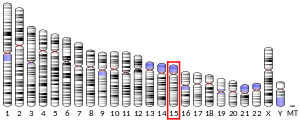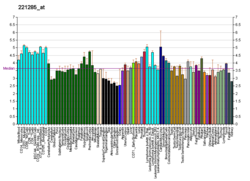Protein-coding gene in the species Homo sapiens
| ST8SIA2 | |||||||||||||||||||||||||||||||||||||||||||||||||||
|---|---|---|---|---|---|---|---|---|---|---|---|---|---|---|---|---|---|---|---|---|---|---|---|---|---|---|---|---|---|---|---|---|---|---|---|---|---|---|---|---|---|---|---|---|---|---|---|---|---|---|---|
| Identifiers | |||||||||||||||||||||||||||||||||||||||||||||||||||
| Aliases | ST8SIA2, HsT19690, SIAT8B, ST8SIA-II, STX, ST8 alpha-N-acetyl-neuraminide alpha-2,8-sialyltransferase 2, SIAT8-B, ST8SiaII | ||||||||||||||||||||||||||||||||||||||||||||||||||
| External IDs | OMIM: 602546; MGI: 106020; HomoloGene: 4384; GeneCards: ST8SIA2; OMA:ST8SIA2 - orthologs | ||||||||||||||||||||||||||||||||||||||||||||||||||
| |||||||||||||||||||||||||||||||||||||||||||||||||||
| |||||||||||||||||||||||||||||||||||||||||||||||||||
| |||||||||||||||||||||||||||||||||||||||||||||||||||
| |||||||||||||||||||||||||||||||||||||||||||||||||||
| |||||||||||||||||||||||||||||||||||||||||||||||||||
| Wikidata | |||||||||||||||||||||||||||||||||||||||||||||||||||
| |||||||||||||||||||||||||||||||||||||||||||||||||||
Alpha-2,8-sialyltransferase 8B is an enzyme that in humans is encoded by the ST8SIA2 gene.
Function
The protein encoded by this gene is a type II membrane protein that is thought to catalyze the transfer of sialic acid from CMP-sialic acid to N-linked oligosaccharides and glycoproteins. The encoded protein may be found in the Golgi apparatus and may be involved in the production of polysialic acid, a modulator of the adhesive properties of neural cell adhesion molecule (NCAM1). This protein is a member of glycosyltransferase family 29.
References
- ^ GRCh38: Ensembl release 89: ENSG00000140557 – Ensembl, May 2017
- ^ GRCm38: Ensembl release 89: ENSMUSG00000025789 – Ensembl, May 2017
- "Human PubMed Reference:". National Center for Biotechnology Information, U.S. National Library of Medicine.
- "Mouse PubMed Reference:". National Center for Biotechnology Information, U.S. National Library of Medicine.
- Scheidegger EP, Sternberg LR, Roth J, Lowe JB (September 1995). "A human STX cDNA confers polysialic acid expression in mammalian cells". The Journal of Biological Chemistry. 270 (39): 22685–8. doi:10.1074/jbc.270.39.22685. PMID 7559389.
- ^ "Entrez Gene: ST8SIA2 ST8 alpha-N-acetyl-neuraminide alpha-2,8-sialyltransferase 2".
Further reading
- Munro S (October 1995). "An investigation of the role of transmembrane domains in Golgi protein retention". The EMBO Journal. 14 (19): 4695–704. doi:10.1002/j.1460-2075.1995.tb00151.x. PMC 394566. PMID 7588599.
- Kitagawa H, Paulson JC (July 1994). "Differential expression of five sialyltransferase genes in human tissues". The Journal of Biological Chemistry. 269 (27): 17872–8. doi:10.1016/S0021-9258(17)32390-6. PMID 8027041.
- Kojima N, Tachida Y, Yoshida Y, Tsuji S (August 1996). "Characterization of mouse ST8Sia II (STX) as a neural cell adhesion molecule-specific polysialic acid synthase. Requirement of core alpha1,6-linked fucose and a polypeptide chain for polysialylation". The Journal of Biological Chemistry. 271 (32): 19457–63. doi:10.1074/jbc.271.32.19457. PMID 8702635.
- Angata K, Nakayama J, Fredette B, Chong K, Ranscht B, Fukuda M (March 1997). "Human STX polysialyltransferase forms the embryonic form of the neural cell adhesion molecule. Tissue-specific expression, neurite outgrowth, and chromosomal localization in comparison with another polysialyltransferase, PST". The Journal of Biological Chemistry. 272 (11): 7182–90. doi:10.1074/jbc.272.11.7182. PMID 9054414.
- Close BE, Colley KJ (December 1998). "In vivo autopolysialylation and localization of the polysialyltransferases PST and STX". The Journal of Biological Chemistry. 273 (51): 34586–93. doi:10.1074/jbc.273.51.34586. PMID 9852130.
- Angata K, Suzuki M, McAuliffe J, Ding Y, Hindsgaul O, Fukuda M (June 2000). "Differential biosynthesis of polysialic acid on neural cell adhesion molecule (NCAM) and oligosaccharide acceptors by three distinct alpha 2,8-sialyltransferases, ST8Sia IV (PST), ST8Sia II (STX), and ST8Sia III". The Journal of Biological Chemistry. 275 (24): 18594–601. doi:10.1074/jbc.M910204199. PMID 10766765.
- Close BE, Wilkinson JM, Bohrer TJ, Goodwin CP, Broom LJ, Colley KJ (November 2001). "The polysialyltransferase ST8Sia II/STX: posttranslational processing and role of autopolysialylation in the polysialylation of neural cell adhesion molecule". Glycobiology. 11 (11): 997–1008. doi:10.1093/glycob/11.11.997. PMID 11744634.
- Angata K, Suzuki M, Fukuda M (September 2002). "ST8Sia II and ST8Sia IV polysialyltransferases exhibit marked differences in utilizing various acceptors containing oligosialic acid and short polysialic acid. The basis for cooperative polysialylation by two enzymes". The Journal of Biological Chemistry. 277 (39): 36808–17. doi:10.1074/jbc.M204632200. PMID 12138100.
- Lazzell DR, Belizaire R, Thakur P, Sherry DM, Janz R (December 2004). "SV2B regulates synaptotagmin 1 by direct interaction". The Journal of Biological Chemistry. 279 (50): 52124–31. doi:10.1074/jbc.M407502200. PMID 15466855.
- Beecken WD, Engl T, Ogbomo H, Relja B, Cinatl J, Bereiter-Hahn J, Oppermann E, Jonas D, Blaheta RA (April 2005). "Valproic acid modulates NCAM polysialylation and polysialyltransferase mRNA expression in human tumor cells". International Immunopharmacology. 5 (4): 757–69. doi:10.1016/j.intimp.2004.12.009. PMID 15710344.
- Arai M, Yamada K, Toyota T, Obata N, Haga S, Yoshida Y, Nakamura K, Minabe Y, Ujike H, Sora I, Ikeda K, Mori N, Yoshikawa T, Itokawa M (April 2006). "Association between polymorphisms in the promoter region of the sialyltransferase 8B (SIAT8B) gene and schizophrenia". Biological Psychiatry. 59 (7): 652–9. doi:10.1016/j.biopsych.2005.08.016. PMID 16229822. S2CID 349683.
- Szabo R, Skropeta D, et al. (2017). "Advancement of Sialyltransferase Inhibitors: Therapeutic Challenges and Opportunities". Med. Res. Rev. 37 (2): 210–270. doi:10.1002/med.21407. PMID 27678392. S2CID 26280291.
This article on a gene on human chromosome 15 is a stub. You can help Misplaced Pages by expanding it. |




